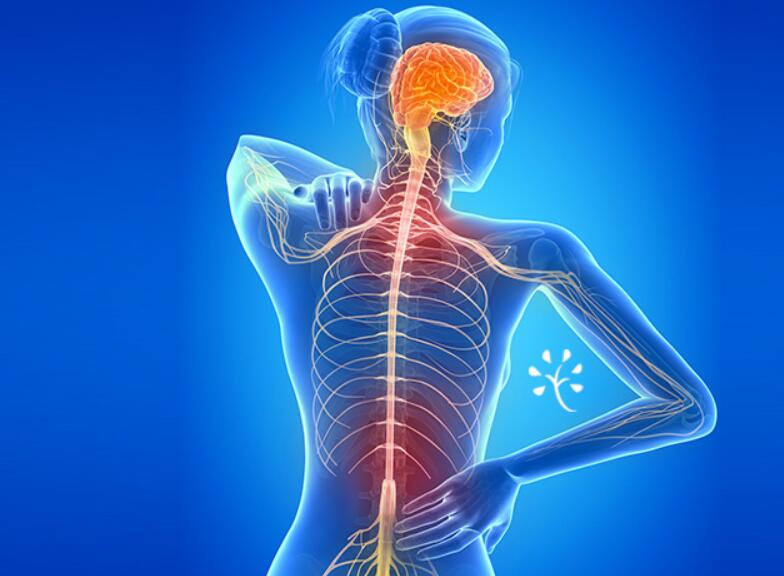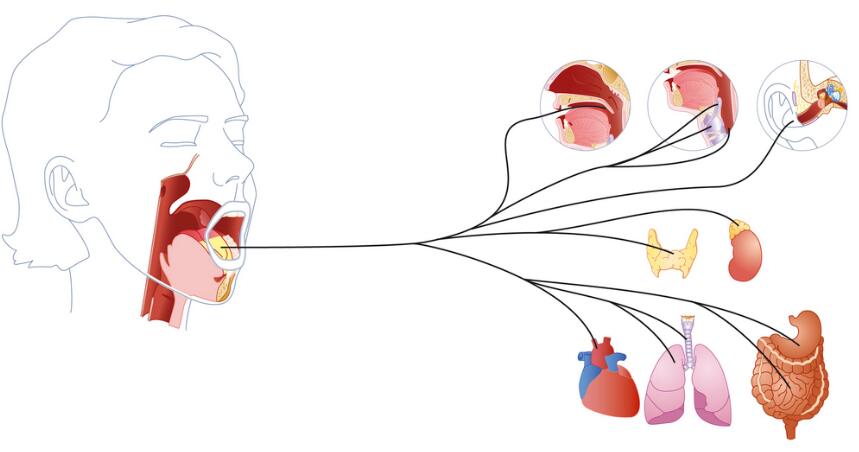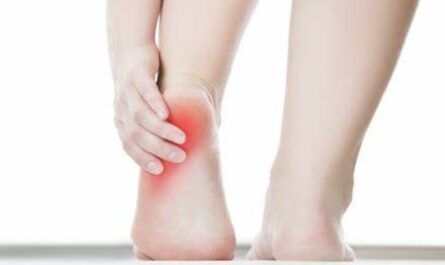The vagus nerve is one of the most important nerves in the human body. It regulates a wide range of bodily functions, from digestion and heart rate to mood and immune response. In this article, we’ll take a closer look at the vagus nerve, its role in the body, common disorders associated with it, and the best ways to stimulate it for optimal health.
What is Vagus Nerve?
The vagus nerve, also known as the 10th cranial nerve or cranial nerve X, is one of the most important nerves in the human body.
It is a part of the parasympathetic nervous system, which is responsible for regulating various involuntary bodily functions such as digestion, heart rate, and breathing.
The vagus nerve originates from the brainstem and extends through the neck, chest, and abdomen. It plays a crucial role in transmitting signals between the brain and various organs, including the heart, lungs, and gastrointestinal tract.
This nerve is responsible for controlling various physiological processes like heart rate, blood pressure, digestion, and the gag reflex.
In recent years, the vagus nerve has gained attention for its potential role in mental health and well-being.
Research has shown that stimulating the vagus nerve can have positive effects on mood, stress levels, and inflammation, which has led to the development of treatments like vagus nerve stimulation (VNS) for conditions like epilepsy and depression.
Anatomy and function of the Vagus Nerve
The Vagus Nerve has two branches: the left and the right. The left branch is responsible for transmitting sensory information from the body to the brain, while the right branch transmits motor signals from the brain to the body. It also communicates with the autonomic nervous system, which controls involuntary body functions.
The Vagus Nerve is important for maintaining homeostasis in the body. It helps to regulate digestion, heart rate, respiration, and other vital organs. It also helps to regulate the immune system, emotions, and social behavior.
In addition, the Vagus Nerve is also involved in the fight-or-flight response and is responsible for calming the body when it is in a state of stress.

Symptoms of Vagus Nerve disorder
Sometimes, your vagus nerve can become overstimulated or underactive and doesn’t function properly.
1. Dysphagia: Difficulty swallowing is a common symptom of vagus nerve dysfunction. This can include difficulty initiating the swallow reflex, difficulty propelling food down the throat, and food getting stuck in the esophagus.
2. Gastrointestinal Symptoms: Abdominal pain, constipation, diarrhea, and other gastrointestinal issues are common in people with vagus nerve dysfunction.
3. Breathing Problems: Dysfunction of the vagus nerve can lead to difficulty breathing and shortness of breath, as well as rapid breathing.
4. Heart Rate Changes: A malfunctioning vagus nerve can cause a decrease in heart rate, leading to lightheadedness, dizziness, and fainting.
5. Hoarseness: Hoarseness of the voice is another symptom of vagus nerve dysfunction.
6. Coughing: Coughing can be a sign of vagus nerve dysfunction, as can a feeling of something stuck in the throat.
7. Chest Pain: People with vagus nerve dysfunction can experience chest pain that is caused by the nerve being irritated.
8. Headache: People with vagus nerve dysfunction can experience headaches, which can be throbbing or sharp.
9. Indigestion: People with vagus nerve dysfunction can experience symptoms of indigestion, including heartburn, nausea, and bloating.
10. Sleep Disturbances: People with vagus nerve dysfunction can experience difficulty sleeping, including insomnia and waking up frequently throughout the night.
Problems Caused by Vagus Nerve Disorders
Some conditions that can damage the vagus nerve and cause problems to include:
1. Vagus Nerve and the Gut
The vagus nerve is heavily connected with the stomach and aids in controlling the digestive system. Damage to the vagus nerve can lead to gastroparesis. When this happens, the digestive system faces unusual contractions and will not be emptied properly.
Watch out for some of these symptoms to ascertain if you are suffering from gastroparesis:
- Loss of appetite or feeling of fullness after eating very little
- Vomiting or nausea after a meal
- Acid reflux
- Sudden weight loss
- Bloating or abdominal pain
- Fluctuations in blood sugar
2. Vagus Nerve and Emotional Health
Since the vagal nerve is connected to the brain stem, it is only expected that this nerve has a lot to do with our mood and how we perceive things.
Studies have shown that when the vagus nerve is in a poor state, there are higher chances of mood swings and heightened anxiety. Work on stimulating the vagus nerve with mindfulness techniques and regulated breathing to help control your emotions.
3. Vagus Nerve and Appetite
The vagus nerve travels from the brain down through the neck and to the stomach area. This means that any problems with the vagal nerve will negatively impact gastrointestinal functions, including your appetite.
Reports have shown that a symptom of vagus nerve disorder is sudden weight gain or obesity. Some other researchers have stated that a poorly functioning vagus nerve will send satisfaction signals to the brain and reduce food intake.
4. Vagus Nerve and Inflammation
Proper vagal tone is critical to maintaining overall body health, but it is essential to regulate inflammation.
Short-term inflammation is necessary for fighting off infections in the body and assisting it in repairing itself. Still, it can negatively impact the body if it sustains for an extended period of time.
Diseases like diabetes, cancer, and even heart disease have been linked to chronic inflammation. Studies have shown that a well-functioning vagal nerve helps in lowering inflammatory responses.
5. Vagus Nerve and Fainting
Fainting is the body’s response to an overload of information where the body decides to shut down. What you might not know is that your body’s queasiness at the sight of blood or gore is known as “vagal syncope,” which occurs when your vagus nerve gets overstimulated and lowers your heart rate and blood pressure.
When your vagal syncope reaches extreme levels, reduced blood flow is directed to the brain, and there is a loss of consciousness. Fainting does not often require medical or professional aid, and you will revive after relaxation.

12 Easy Ways to Stimulate the Vagus Nerve
Science and an impressive amount of research have shown how stimulation of the vagus nerve can improve its functionality.
1. Probiotics
By introducing some probiotics into your system, you can greatly boost your vagal nerve functions and improve your overall health.
In research on the effect of Lactobacillus on the gut-brain link, taking lactobacillus probiotics improves gastrointestinal health, and taking probiotics also helps reduce anxiety, stress, and depression.
2. Cold Stimulation
You can stimulate the vagus nerve by applying cold water to your face or pressing a cold compress to the back of your neck. Research has shown how cold temperatures can positively stimulate the vagus nerve and increase vagus activity.
3. Emotional Health
Positive emotional health is linked to many things, and the vagus nerve is one of them. Research has shown that subjects exposed to Loving-Kindness Meditation to introduce positivity to their emotional state of being were reported as having a better vagal tone.
It is recommended that people engage in activities that will boost their social and emotional health positively. Examples of such activities include mindfulness techniques, yoga, and meditation.
4. Breathing Techniques
There is enough evidence to show that the vagus nerve can be stimulated and boosted with breathing techniques. Also, deep and steady breathing is especially handy during stressful situations where a fight or flight response might be triggered.
A study has shown that a daily 15-minute breathing exercise performed for 2 weeks will positively impact overall health.
5. Yoga Stimulation for the Vagus Nerve
Exercising has always been one of the answers for many physical and even mental ailments. Regular physical activity is necessary to help boost cardiovascular health.
You can stimulate your vagus nerve with yoga exercises that require conscious, deliberate breathing. Certain yoga exercises improve your vagal tones, lower blood pressure, and manage anxiety.
In a study on a group of people, the people who took intensive yoga exercises had better moods and heart rates than the control group that took regular walking exercises.
6. Massages
Massaging your body can help soothe muscles, improve circulation, and reduce stress. Aside from its relaxing benefits, massaging certain areas of your body can increase your body’s vagal activity.
For example, according to The Journal of Clinical Neuroscience research, massaging the carotid sinus on the sides of your neck could stimulate the vagus nerve and increase vagal modulation and heart rate variability.
Massaging your carotid sinus is also used to reduce the frequency and magnitude of epilepsy seizures.
7. Intermittent Fasting
A good way to stimulate the vagus nerve and improve overall health is through intermittent fasting. Intermittent fasting is fast gaining popularity, and more and more people understand the benefits of the 5:2 diet.
The lifestyle involves following a regular meal plan 5 days a week and engaging in a partial fast for two days out of the week.
Among the many benefits of intermittent fasting includes weight loss and controlled calorie intake for both men and women. Studies have also shown that intermittent fasting positively affects the vagus nerve.
8. Acupuncture
Acupuncture is one activity that transmits signals into the vagus nerve and triggers anti-inflammatory responses in the spleen. What’s more? Studies have provided evidence that acupuncture improves vagal activity, respiratory health, gut health, and heart health.
Besides improving the vagal tone, recent research on the health benefits of acupuncture showed it could also protect against neurodegenerative diseases.
9. Laughter
Laughing is one of the easiest ways to boost your mood, reduce anxiety, and stimulate your vagus nerve. The reason is, laughing requires diaphragmatic breathing and activates the parasympathetic system.
The journal Alternative Therapies in Health and Medicine published a study on the tremendous benefits of laughter on vagal tone and heart rate variability. If you’re looking to stimulate your vagus nerve naturally, laughter is the best medicine.
10. Taking Omega-3 supplements
Omega 3 provides incredible benefits to the heart and improves your vagal response. Fish oil improves cognitive depression symptoms, keeps the heart healthy, and reduces inflammation.
11. Taking serotonin supplements
Serotonin is a neurotransmitter in the gut that boosts mood, controls depression, reduces hypertension, and stimulates the vagus nerve. Taking serotonin supplements helps to boost the production of serotonin in the brain and improves vagal activity.
12. Humming and Singing
The vagus nerve runs through your neck and controls your vocal cord muscles and the muscles at the back of your throat.
Humming a short song in the shower, singing your favorite song, or gargling can stimulate your vagus nerve and improve your mental health.
Singing requires guided breathing, which can influence your vagal response. In fact, in a study carried out on a group of people, including singers. The adult singers had a better heart rate variability and vagal tone than people who didn’t sing.
Treatment for Vagus Nerve Disorders
1. Consult with a doctor
The first thing you should do as soon as you suspect damage to your vagus nerve is to book a consultation with your doctor. After your doctor performs some necessary examinations, they will determine what the next step will be and might refer you to a nerve therapist who will be able to pinpoint what your problem is.
2. Medication
Anticonvulsants, antidepressants, and anticholinergics are often used to treat vagus nerve disorders. These medications can help reduce symptoms such as seizures, muscle spasms, and excessive sweating.
3. Surgery
If medications are ineffective, surgery may be necessary to treat some vagus nerve disorders. Depending on the type of disorder, a surgeon may be able to remove a tumor, repair a damaged nerve, or repair damaged blood vessels.
4. Physical Therapy
Physical therapy can help strengthen weakened muscles and improve coordination. Exercise can also help reduce pain and inflammation.
4. Speech Therapy
Speech therapy can help improve the ability to speak and understand language. It can also help improve the ability to swallow and manage saliva.
6. Diet and Lifestyle Changes
Eating a healthy diet and making lifestyle changes can help reduce symptoms of vagus nerve disorders. This includes reducing stress and avoiding triggers such as certain foods, alcohol, and caffeine.
7. Alternative Therapies
Some people may find relief from vagus nerve disorders with alternative therapies such as acupuncture, biofeedback, and yoga. These therapies can help reduce stress, improve breathing, and regulate the nervous system.
When to see a doctor?
It is important to see a doctor for any signs of a vagus nerve disorder. Common physical symptoms include abdominal pain, nausea, vomiting, and difficulty swallowing. Emotional symptoms might include anxiety, depression, or fatigue. If any of these symptoms persist for over a few days, it is important to seek medical attention.
In addition, other associated symptoms should be brought to the attention of a doctor. These might include difficulty regulating heart rate and blood pressure, feelings of faintness, and shortness of breath. If these symptoms are severe, it is best to seek medical attention immediately.







Nice summary, well done.